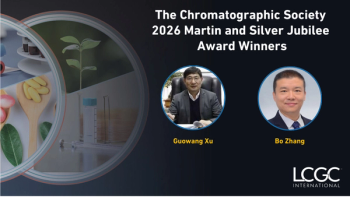
Best of the Week: Non-Targeted Screening, Green Preparative Methods, and More
Here are the top five articles published on LCGC International this week.
This week, LCGC International published a variety of articles on the hottest topics in chromatography and beyond. Below, we’ve highlighted some of the most popular articles, according to our readers. Happy reading!
Alasdair Matheson
Jan H. Christensen is a Professor in Environmental Analytical Chemistry. He is the leader of the Analytical Chemistry group, Faculty of Science at the University of Copenhagen, Denmark and heads the Research Centre for Advanced Analytical Chemistry (RAACE). His group develops analytical methods and new tools to handle and process complex multidimensional chromatographic data. The main application areas are currently suspect- and non-target screening of organic and inorganic contaminants in waste-, surface-, and drinking water; as well as sustainable fuels; plant–microbe interactions, and foods. At HTC-18 in Leuven, we spoke to Christensen about his conference presentation.
Alasdair Matheson
Martina Catani is an assistant professor of analytical chemistry at the Department of Chemical, Pharmaceutical and Agricultural Sciences of the University of Ferrara, Ferrara, Italy. Martina works in the field of liquid chromatography (LC) for both analytical and preparative purposes. Her research activities revolve around applicative and fundamental aspects of LC separations. More recently, she has been focusing on novel analytical approaches in “omics science." At HTC-18 in Leuven, we spoke to Martina Catani from the University of Ferrara about her recent research focusing on novel green preparative methods used for biopharmaceutical purification.
Navin Rauniyar, Xuemei Han
Recombinant monoclonal antibodies (mAbs) are biotherapeutics known for their high selectivity in binding to target antigens and inducing an immune response. Multiple structural variants may arise in mAbs due to post-translational modifications (PTMs) or processes like fragmentation, dimerization, or aggregation. The characterization of product-related variants in monoclonal antibodies involves identifying and quantifying the size and charge of variants that can impact the activity, efficacy, and safety of the antibodies. These variants represent distinct molecular forms that may arise from processes such as fragmentation, dimerization, aggregation, or post-translational modifications. Here, we discussed commonly used analytical techniques for this process. Identifying product-related variants through characterization enables the recognition of impurities that compromise the quality and safety of the drug.
Caroline Hroncich
The 52nd International Symposium on High Performance Liquid Phase Separations and Related Techniques (HPLC 2024) will take place from July 20-25, 2024, in Denver, Colorado. The conference will bring together separation scientists from around the world to discuss the latest research and trends in high performance liquid chromatography (HPLC). The event will feature a robust program with tracks focused on pharmaceutical analysis, predictive modeling, column technology, and more. Below, we highlight several keynote sessions that attendees can add to their list.
Aaron Acevedo
The 2024 HPLC conference will be held from July 20–25 in Denver, Colorado. During the event, awards will be presented to scientists who have made significant contributions to analytical chemistry and separation science. Below, the editors of LCGC International provide a preview of the 2024 awards program and what attendees can expect. These awards include the Uwe D. Neue Award in Separation Science, the Csaba Horváth Young Scientist Award, and the Chromatography Society Jubilee Medal, among others.
Newsletter
Join the global community of analytical scientists who trust LCGC for insights on the latest techniques, trends, and expert solutions in chromatography.




